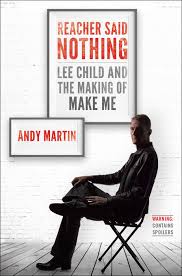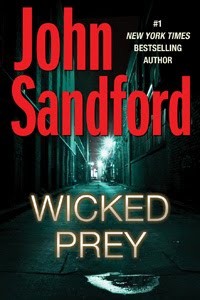I am reading an extremely interesting book which will see the light of day next week — Tuesday, November 24, 2015, to be exact — everywhere books are sold. It is titled REACHER SAID NOTHING: Lee Child and the Making of Make Me. It is written by Andy Martin, who teaches at Cambridge but is nonetheless capable of writing a fun book, and more so, a fun book about the writing process. What occurred is that Martin approached Child via email in August 2014 about writing a book that would take the reader from the very beginning of the process by which Child does what he does so well to the very end. Martin’s timing was perfect, given that Child was about to start writing what ultimately became MAKE ME, his latest Jack Reacher novel.
I’m not going to present my review of REACHER SAID NOTHING now — you’ll have to go here next week over the Thanksgiving weekend to see that — but I can tell you that if you have ever thought of writing a novel you need to get a copy of REACHER SAID NOTHING and sit down and read it. You’ll feel better about the process, for sure. I can assure you that, whatever problem you may have had with completing your work, Child has had it as well, and yes, still has it and works to overcome it year in and year out. You will find within the pages of REACHER SAID NOTHING how he does it, as well as the very first thing that Child did when he started writing the very first Reacher book, lo those many years ago. Child utilizes many tools — copious amounts of coffee and cigarettes among them — but you don’t have to have move into Starbucks or have access to a secret stash of Chesterfield Kings to have similar results, with “similar results” being finishing your book, and then writing another, and another. And no, I’m not going to give away the specifics. Martin gave up a year of his life following Child around with proximity and access that would make a proctologist jealous, and then compiled it all into something readable, so it would be neither fair nor right. I will tell you in one general word, however, how Child does what he does: discipline. That’s it. He sits down (among other things) and gets it done. The process of doing that is a part of Martin’s book, and so far, that book is an entertaining hodgepodge of an account consisting of emails, diary entries, and transcripts of conversations.
Will reading REACHER SAID NOTHING help you to write a bestseller or a critically acclaimed work? No. No. No. Life is not fair. Equity is not equal. If you want justice go to theology school and cross your fingers; maybe you’ll get it. But, if you model your work ethic after Child, you’ll finish your book, The rest is a combination of luck and ability and timing. As far as writing goes, remember that just because you like sausage doesn’t mean you want to make it. Have at it, by all means, but know what you are getting into. And if you still want to by the time you finish REACHER SAID NOTHING, by all means: start, and never stop until the job is done.
From my house to yours: Happy Thanksgiving! I’m old and grumpy and experiencing a health issue that is more an inconvenience than a herald of mortality but it’s a reminder that the sand is running, ever running, through the hourglass. Still, I have much to be thankful for, and you would be very high on that list, for stopping by The Kill Zone and spending a few minutes with us. Thank you.




